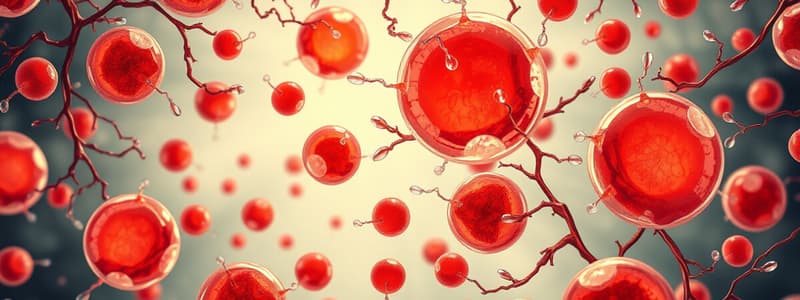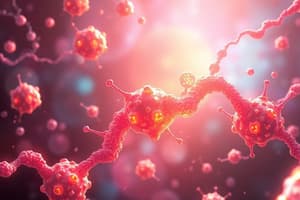Podcast
Questions and Answers
What is the most abundant class of plasma protein?
What is the most abundant class of plasma protein?
Albumin
What is the effect of low plasma albumin?
What is the effect of low plasma albumin?
Osmotic pressure decreases; thus water moves from the capillaries to the interstitium.
What is the life span of an erythrocyte (in days)?
What is the life span of an erythrocyte (in days)?
100 to 120
What does the student learn about erythrocytes?
What does the student learn about erythrocytes?
What are granulocytes that contain granules of vasoactive amines, such as histamine, called?
What are granulocytes that contain granules of vasoactive amines, such as histamine, called?
Which of these are formed elements of the blood that are not cells but are disk-shaped cytoplasmic fragments essential for blood clotting?
Which of these are formed elements of the blood that are not cells but are disk-shaped cytoplasmic fragments essential for blood clotting?
What are blood cells that differentiate into macrophages known as?
What are blood cells that differentiate into macrophages known as?
Without prior exposure to an antigen, which cells are able to destroy some types of tumor cells and some virus-infected cells?
Without prior exposure to an antigen, which cells are able to destroy some types of tumor cells and some virus-infected cells?
What is the life span of platelets (in days)?
What is the life span of platelets (in days)?
Fetal hematopoiesis occurs primarily in which structure?
Fetal hematopoiesis occurs primarily in which structure?
What is the consequence of a splenectomy?
What is the consequence of a splenectomy?
A professor explains that the reason lymph nodes enlarge and become tender during infection is because of what reason?
A professor explains that the reason lymph nodes enlarge and become tender during infection is because of what reason?
Which hemoglobin is made from oxidized ferric iron (Fe3+) and lacks the ability to bind oxygen?
Which hemoglobin is made from oxidized ferric iron (Fe3+) and lacks the ability to bind oxygen?
Flashcards are hidden until you start studying
Study Notes
Plasma Proteins
- Albumin is the most abundant plasma protein, constituting about 60% of total plasma protein with a concentration of approximately 4 g/dL.
Effects of Low Plasma Albumin
- Decreased osmotic pressure leads to water moving from capillaries to interstitium, causing swelling.
- Occurs due to decreased production (e.g., cirrhosis, liver diseases, protein malnutrition) or excessive loss (e.g., kidney diseases, burns).
- Low albumin does not impact clotting factors, immunoglobulins, or iron levels.
Erythrocyte Life Span
- Erythrocytes have a limited life span of 100 to 120 days due to the inability to undergo mitotic division.
Erythrocyte Characteristics
- Erythrocytes can change shape to navigate through tiny blood vessels.
- Mature erythrocytes lack a nucleus and organelles, preventing protein synthesis and oxidative reactions.
- Males typically have a higher erythrocyte percentage compared to females (48% vs. 42%).
Granulocytes
- Basophils contain granules rich in vasoactive amines like histamine, chemotactic factors, and proteolytic enzymes, and act as anticoagulants.
Platelets
- Platelets (thrombocytes) are disk-shaped cytoplasmic fragments crucial for blood clotting, not true cells.
Monocytes
- Monocytes are blood cells that differentiate into macrophages when they migrate into tissues.
- They do not transform from neutrophils, eosinophils, or basophils.
Natural Killer Cells
- NK cells can destroy certain tumor and virus-infected cells without prior antigen exposure, unlike lymphocytes and plasma cells.
Platelet Life Span
- Platelets live approximately 8 to 11 days in circulation before macrophages in the spleen remove them.
Fetal Hematopoiesis
- The spleen is the primary site for fetal hematopoiesis, being the largest secondary lymphoid organ.
Consequences of Splenectomy
- Removal of the spleen leads to an increase in defective blood cells in circulation, confirming its role in filtering old or damaged cells.
- Splenectomy does not affect iron levels or increase antibody production or clotting factors.
Lymph Node Response in Infections
- During an infection, lymph node enlargement and tenderness result from the proliferation of B lymphocytes in response to antigens.
Methemoglobin
- Methemoglobin is composed of oxidized ferric iron (Fe3+) and cannot bind oxygen without reactivation, limiting its function.
Studying That Suits You
Use AI to generate personalized quizzes and flashcards to suit your learning preferences.




